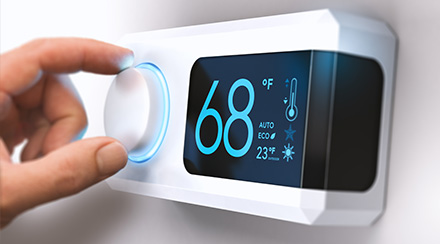Gas Vs. Electric Dryers: Which Is Right for You?

A clothes dryer is a must-have appliance for many households, but like all heat-generating appliances, it can be an energy hog. It can also break down, potentially leading to expensive repairs. And if you’re in the market for a new dryer, there are all sorts of factors to consider like purchase price, safety and environmental impact. But the attribute you should consider first is usually the energy source: natural gas or electricity.
Gas and electric dryers do the same job, and they do it in a similar way – but because they use different energy sources, there are a few other areas in which they’re significantly different.
Key Differences Between Gas and Electric Dryers
Energy Efficiency and Cost of Operation
These factors need to be considered together, because when you’re comparing gas and electric dryers, the most efficient model may not necessarily have the lowest cost of operation. That’s because natural gas and electricity have different prices that vary by region and are constantly fluctuating. If you live in an area where natural gas prices are typically very competitive and electricity tends to be expensive, a gas dryer may save you money in the long run over an electric dryer that is more energy efficient.
Not long ago, gas dryers were considered to be more energy efficient than electric dryers because they tended to heat up faster and get hotter, which allowed for shorter drying cycles. In recent years, however, electric dryers have caught up and are regularly outcompeting gas dryers in the ENERGY STAR Most Efficient product listing.
Fortunately, gas and electric dryers have a common efficiency rating that makes it easy to compare models. It’s called the Combined Energy Factor, or CEF. The higher the CEF, the more efficient the dryer – so look for it whenever you’re shopping for dryers online or at retail. If you don’t see the CEF, find the model number or name and look it up on the ENERGY STAR website.
Ultimately, you’ll want to consider energy efficiency and cost of operation separately. Check your current local rates and recent price trends for both natural gas and electricity to see if one is substantially more competitive than the other. Once you’ve chosen an energy source, use CEF ratings to make sure you’re buying an efficient model of that type.
Environmental Friendliness

Because there are gas dryers that meet high energy efficiency standards, you might assume that those dryers are better for the environment than less efficient electric dryers. But not everyone agrees that the link between energy efficiency and environmental friendliness is so simple; as of 2022, ENERGY STAR has stopped listing gas-powered appliances in its “Most Efficient” listing.
The reasoning behind this change is that electricity can be generated through clean, renewable sources like solar, wind and hydropower, while natural gas will always be an inherently carbon-producing fuel. Even though much of our electricity supply is still generated by burning fossil fuels including natural gas and coal, we’re steadily replacing those sources with renewables, which is making electricity an ever-cleaner energy source. So when you’re considering long-term environmental friendliness, electric dryers have the edge.
Installation
Gas and electric dryers require different types of hookups. Gas dryers need to be connected to an accessible natural gas line, so if there isn’t one available, it will need to be installed. They must also be vented to the outdoors, which can limit the locations where it’s practical to install a gas dryer. Most gas dryers plug into a standard 120-volt outlet.
Electric dryers do not need gas line access, but they plug into 240-volt outlets, which should be professionally installed by electricians. Most electric dryers also vent to the outdoors, but this is only to expel hot, humid air – not dangerous gasses. If you need to install a dryer in an area that doesn’t have convenient vent access, there are ventless electric dryers designed for those circumstances.
It’s common for homes to have a designated laundry room with washer and dryer hookups, and for that room to have hookups for a gas or electric dryer – but not both. In a home that is only set up for one type of dryer, it often makes financial sense to stick with that type. Installing a new gas line branch or 240-volt outlet typically costs a few hundred dollars or potentially more, depending on the complexity of the installation.
Purchase Price and Repair Costs
Gas dryers typically cost more to purchase; when you see two models that are identical with the exception of the energy source, you should expect the gas dryer to be at least $100 more. As with all gas appliances, most repairs should be left to qualified technicians for safety’s sake, which can make maintenance and repair costs more expensive, too.
In addition to their lower purchase prices, electric dryers can be cheaper to maintain because they don’t require special skills to make many common repairs. If you need to replace the belt or a sensor, you may be comfortable taking it on as a DIY project.
Safety

Gas and electric dryers are both safe when they are installed, maintained and used properly. But they can malfunction dangerously in rare cases if they are used improperly or if there is a mechanical or electrical problem, and the safety risks differ by type.
Any appliance that runs on natural gas poses two safety concerns. First, natural gas can leak into a home due to improper installation, appliance malfunction or damage, which can cause natural gas poisoning or lead to a fire or explosion. Second, gas appliances produce carbon monoxide that can leak into a home due to improper or obstructed venting, causing illness or even death.
Gas dryers should always be installed, maintained and repaired by licensed repair professionals to minimize these risks. But because unseen damage can occur, there are two other precautions you should take. Be alert and take immediate action if you ever notice the telltale rotten egg smell coming from your laundry room – open windows if possible and evacuate the home, along with all other people and pets. Call your local gas utility to report the issue and follow their instructions. Also, install a carbon monoxide detector near your dryer and evacuate the home immediately if it alerts you to a leak. Don’t forget to test it regularly and replace the batteries every six months.
These concerns don’t apply to electric dryers, but both types of dryers can pose a small risk of electric shock due to faulty or damaged wiring. They can also both pose a small fire risk due to clogged lint filters, debris near the dryer and other types of improper use. It’s a good idea to read the safety instructions in your dryer’s manual and follow the manufacturer-specific recommendations.
Are Gas or Electric Dryers Better?
As you can see, there are a lot of factors to consider, and there’s no one-size-fits-all answer. In many cases, it may make sense to just stick with whatever type of dryer the home is already set up to accommodate. In other cases, local energy prices may justify a switch. And if you’re trying to reduce your home’s carbon footprint, making the switch from gas to electric can be part of the solution. But whatever you choose, maximize the efficiency and safety of your dryer by cleaning it regularly and following the manufacturer’s instructions.
Looking for ways to reduce your energy use? Read our article on energy-saving tips for more of our best methods to save energy in your home.
Looking for Something Specific?
Select a category to find resources for topics that interest you.
Select Category

Related Articles:

Tips for Improving Your AC and Furnace Efficiency
We share maintenance tips for your heater and AC, and home improvement tips to help you use those systems less.
Read Article
Tips for Saving on Energy in Your Home
If you’re looking to learn more about energy efficiency for home systems and appliances, we’re sharing our favorite energy-saving tips.
Read Article
What Uses the Most Electricity In a Home?
We break down what uses the most energy in your home to give you an understanding of where your energy usage goes and where energy-saving tactics can make the most impact.
Read ArticleMost Popular Articles

Energy Plans to Fit Your Lifestyle
NRG offers electricity and natural gas plans with perks like cash back, travel rewards and more, so you can find a plan that fits your home and family.
Gas Vs. Electric Dryers: Which Is Right for You?
A clothes dryer is a must-have appliance for many households, but like all heat-generating appliances, it can be an energy hog. It can also break down, potentially leading to expensive repairs. And if you’re in the market for a new dryer, there are all sorts of factors to consider like purchase price, safety and environmental impact. But the attribute you should consider first is usually the energy source: natural gas or electricity.
Gas and electric dryers do the same job, and they do it in a similar way – but because they use different energy sources, there are a few other areas in which they’re significantly different.
Key Differences Between Gas and Electric Dryers
Energy Efficiency and Cost of Operation
These factors need to be considered together, because when you’re comparing gas and electric dryers, the most efficient model may not necessarily have the lowest cost of operation. That’s because natural gas and electricity have different prices that vary by region and are constantly fluctuating. If you live in an area where natural gas prices are typically very competitive and electricity tends to be expensive, a gas dryer may save you money in the long run over an electric dryer that is more energy efficient.
Not long ago, gas dryers were considered to be more energy efficient than electric dryers because they tended to heat up faster and get hotter, which allowed for shorter drying cycles. In recent years, however, electric dryers have caught up and are regularly outcompeting gas dryers in the ENERGY STAR Most Efficient product listing.
Fortunately, gas and electric dryers have a common efficiency rating that makes it easy to compare models. It’s called the Combined Energy Factor, or CEF. The higher the CEF, the more efficient the dryer – so look for it whenever you’re shopping for dryers online or at retail. If you don’t see the CEF, find the model number or name and look it up on the ENERGY STAR website.
Ultimately, you’ll want to consider energy efficiency and cost of operation separately. Check your current local rates and recent price trends for both natural gas and electricity to see if one is substantially more competitive than the other. Once you’ve chosen an energy source, use CEF ratings to make sure you’re buying an efficient model of that type.
Environmental Friendliness
Because there are gas dryers that meet high energy efficiency standards, you might assume that those dryers are better for the environment than less efficient electric dryers. But not everyone agrees that the link between energy efficiency and environmental friendliness is so simple; as of 2022, ENERGY STAR has stopped listing gas-powered appliances in its “Most Efficient” listing.
The reasoning behind this change is that electricity can be generated through clean, renewable sources like solar, wind and hydropower, while natural gas will always be an inherently carbon-producing fuel. Even though much of our electricity supply is still generated by burning fossil fuels including natural gas and coal, we’re steadily replacing those sources with renewables, which is making electricity an ever-cleaner energy source. So when you’re considering long-term environmental friendliness, electric dryers have the edge.
Installation
Gas and electric dryers require different types of hookups. Gas dryers need to be connected to an accessible natural gas line, so if there isn’t one available, it will need to be installed. They must also be vented to the outdoors, which can limit the locations where it’s practical to install a gas dryer. Most gas dryers plug into a standard 120-volt outlet.
Electric dryers do not need gas line access, but they plug into 240-volt outlets, which should be professionally installed by electricians. Most electric dryers also vent to the outdoors, but this is only to expel hot, humid air – not dangerous gasses. If you need to install a dryer in an area that doesn’t have convenient vent access, there are ventless electric dryers designed for those circumstances.
It’s common for homes to have a designated laundry room with washer and dryer hookups, and for that room to have hookups for a gas or electric dryer – but not both. In a home that is only set up for one type of dryer, it often makes financial sense to stick with that type. Installing a new gas line branch or 240-volt outlet typically costs a few hundred dollars or potentially more, depending on the complexity of the installation.
Purchase Price and Repair Costs
Gas dryers typically cost more to purchase; when you see two models that are identical with the exception of the energy source, you should expect the gas dryer to be at least $100 more. As with all gas appliances, most repairs should be left to qualified technicians for safety’s sake, which can make maintenance and repair costs more expensive, too.
In addition to their lower purchase prices, electric dryers can be cheaper to maintain because they don’t require special skills to make many common repairs. If you need to replace the belt or a sensor, you may be comfortable taking it on as a DIY project.
Safety
Gas and electric dryers are both safe when they are installed, maintained and used properly. But they can malfunction dangerously in rare cases if they are used improperly or if there is a mechanical or electrical problem, and the safety risks differ by type.
Any appliance that runs on natural gas poses two safety concerns. First, natural gas can leak into a home due to improper installation, appliance malfunction or damage, which can cause natural gas poisoning or lead to a fire or explosion. Second, gas appliances produce carbon monoxide that can leak into a home due to improper or obstructed venting, causing illness or even death.
Gas dryers should always be installed, maintained and repaired by licensed repair professionals to minimize these risks. But because unseen damage can occur, there are two other precautions you should take. Be alert and take immediate action if you ever notice the telltale rotten egg smell coming from your laundry room – open windows if possible and evacuate the home, along with all other people and pets. Call your local gas utility to report the issue and follow their instructions. Also, install a carbon monoxide detector near your dryer and evacuate the home immediately if it alerts you to a leak. Don’t forget to test it regularly and replace the batteries every six months.
These concerns don’t apply to electric dryers, but both types of dryers can pose a small risk of electric shock due to faulty or damaged wiring. They can also both pose a small fire risk due to clogged lint filters, debris near the dryer and other types of improper use. It’s a good idea to read the safety instructions in your dryer’s manual and follow the manufacturer-specific recommendations.
Are Gas or Electric Dryers Better?
As you can see, there are a lot of factors to consider, and there’s no one-size-fits-all answer. In many cases, it may make sense to just stick with whatever type of dryer the home is already set up to accommodate. In other cases, local energy prices may justify a switch. And if you’re trying to reduce your home’s carbon footprint, making the switch from gas to electric can be part of the solution. But whatever you choose, maximize the efficiency and safety of your dryer by cleaning it regularly and following the manufacturer’s instructions.
Looking for ways to reduce your energy use? Read our article on energy-saving tips for more of our best methods to save energy in your home.
Looking for Something Specific?
Select a category to find resources for topics that interest you.
Select Category

Related Articles:

Tips for Improving Your AC and Furnace Efficiency
We share maintenance tips for your heater and AC, and home improvement tips to help you use those systems less.
Read Article
Tips for Saving on Energy in Your Home
If you’re looking to learn more about energy efficiency for home systems and appliances, we’re sharing our favorite energy-saving tips.
Read Article
What Uses the Most Electricity In a Home?
We break down what uses the most energy in your home to give you an understanding of where your energy usage goes and where energy-saving tactics can make the most impact.
Read ArticleMost Popular Articles

Energy Plans to Fit Your Lifestyle
NRG offers electricity and natural gas plans with perks like cash back, travel rewards and more, so you can find a plan that fits your home and family.







